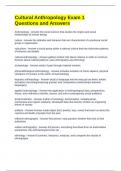-
1. Exam (elaborations) - Anthro 102 - intro to anthropology - exam questions with complete solutions
-
2. Exam (elaborations) - Anthro exam 1 wvu questions and answers
-
3. Exam (elaborations) - Anthropology 1000 exam 1- questions and answers
-
4. Exam (elaborations) - Anthropology exam #1 (ch 1-4) questions with correct answers
-
5. Exam (elaborations) - Anthropology exam #1- people questions and answers
-
6. Exam (elaborations) - Anthropology exam #3 questions with correct answers
-
7. Exam (elaborations) - Anthropology exam 1 and 2 review questions and answers
-
8. Exam (elaborations) - Anthropology exam 1 archaeology questions and answers
-
9. Exam (elaborations) - Anthropology exam 1 key terms and quiz questions with correct answers
-
10. Exam (elaborations) - Anthropology exam 1 make up questions and answers
-
11. Exam (elaborations) - Anthropology exam 1 multiple choice exam questions and answers
-
12. Exam (elaborations) - Anthropology exam 1 questions with correct answers
-
13. Exam (elaborations) - Anthropology exam 1 questions with latest update
-
14. Exam (elaborations) - Anthropology exam 1 review questions and answers
-
15. Exam (elaborations) - Anthropology exam 1 study guide questions and answers
-
16. Exam (elaborations) - Anthropology exam 1 study guide questions and answers
-
17. Exam (elaborations) - Anthropology exam 1 uark questions with latest update
-
18. Exam (elaborations) - Anthropology final exam questions with complete solutions
-
19. Exam (elaborations) - Anthropology exam review questions with verified answers
-
20. Exam (elaborations) - Anthropology exam review questions with latest update
-
21. Exam (elaborations) - Anthropology exam questions with verified answers
-
22. Exam (elaborations) - Anthropology exam questions and answers verified answers
-
23. Exam (elaborations) - Anthropology exam questions and answers latest update
-
24. Exam (elaborations) - Anthropology exam questions and answers latest update
-
25. Exam (elaborations) - Anthropology exam material questions and answers
-
26. Exam (elaborations) - Anthropology exam chapters 1-5 questions and answers
-
27. Exam (elaborations) - Anthropology exam 4 questions with latest update
-
28. Exam (elaborations) - Anthropology exam 2 with correct answers
-
29. Exam (elaborations) - Anthropology final exam questions with verified answers
-
30. Exam (elaborations) - Anthropology midterm exam questions with correct answers
-
31. Exam (elaborations) - Anthropology of alcohol exam questions with correct answers
-
32. Exam (elaborations) - Anthropology semester 1 exam questions with correct answers
-
33. Exam (elaborations) - Anthropology test 1 exam questions with complete solutions
-
34. Exam (elaborations) - Anthropology true false exam questions and answers
-
35. Exam (elaborations) - Anthropology-exam 5 questions and answers
-
36. Exam (elaborations) - Applied anthropology exam questions and answers
-
37. Exam (elaborations) - Biological anthropology exam 1 review questions with correct answers
-
38. Exam (elaborations) - Chapters 1-4--> exam 1 anthropology questions and answers
-
39. Exam (elaborations) - Cultural anthropology - exam questions and answers
-
40. Exam (elaborations) - Cultural anthropology exam 1- culture concept, doing fieldwork, language, subsistence...
-
41. Exam (elaborations) - Cultural anthropology exam 1 questions and answers
-
42. Exam (elaborations) - Cultural anthropology exam 2 questions with correct answers
-
43. Exam (elaborations) - Ecu anthropology 1000 exam 1 questions and answers
-
44. Exam (elaborations) - Exam 1 chapters 1-4(anthropology) questions and answers
-
45. Exam (elaborations) - General anthropology exam #1 questions and answers
-
46. Exam (elaborations) - Intro to anthropology - exam 1 questions and answers
-
47. Exam (elaborations) - Intro to anthropology final exam questions with complete solutions
-
48. Exam (elaborations) - Intro to cultural anthropology exam questions with latest update
-
49. Exam (elaborations) - Introduction to biological anthropology exam questions and answers
-
50. Exam (elaborations) - Uatk biological anthropology exam questions with latest update
-
51. Exam (elaborations) - Social anthropology exam questions and answers
-
52. Exam (elaborations) - Physical anthropology exam 1 questions with latest update
-
53. Exam (elaborations) - Linguistic anthropology exam 1 questions with complete solutions
-
54. Exam (elaborations) - Introduction to cultural anthropology exam questions with latest update
-
Show more




